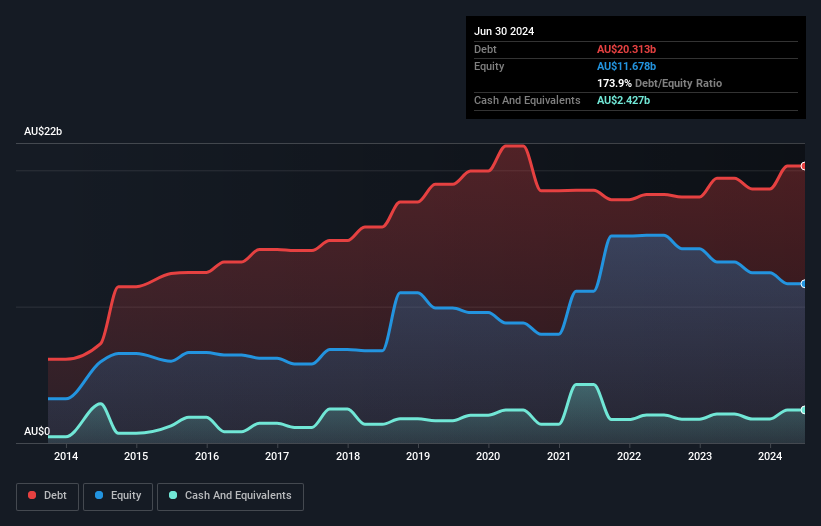
Legendary fund manager Li Lu (who Charlie Munger backed) once said, 'The biggest investment risk is not the volatility of prices, but whether you will suffer a permanent loss of capital.' When we think about how risky a company is, we always like to look at its use of debt, since debt overload can lead to ruin. As with many other companies Transurban Group (ASX:TCL) makes use of debt. But the more important question is: how much risk is that debt creating?
When Is Debt A Problem?
Generally speaking, debt only becomes a real problem when a company can't easily pay it off, either by raising capital or with its own cash flow. If things get really bad, the lenders can take control of the business. While that is not too common, we often do see indebted companies permanently diluting shareholders because lenders force them to raise capital at a distressed price. Of course, the upside of debt is that it often represents cheap capital, especially when it replaces dilution in a company with the ability to reinvest at high rates of return. The first step when considering a company's debt levels is to consider its cash and debt together.
See our latest analysis for Transurban Group
How Much Debt Does Transurban Group Carry?
You can click the graphic below for the historical numbers, but it shows that as of June 2024 Transurban Group had AU$20.3b of debt, an increase on AU$19.4b, over one year. However, it does have AU$2.43b in cash offsetting this, leading to net debt of about AU$17.9b.

A Look At Transurban Group's Liabilities
According to the last reported balance sheet, Transurban Group had liabilities of AU$3.70b due within 12 months, and liabilities of AU$21.3b due beyond 12 months. On the other hand, it had cash of AU$2.43b and AU$336.0m worth of receivables due within a year. So it has liabilities totalling AU$22.3b more than its cash and near-term receivables, combined.
While this might seem like a lot, it is not so bad since Transurban Group has a huge market capitalization of AU$42.0b, and so it could probably strengthen its balance sheet by raising capital if it needed to. But it's clear that we should definitely closely examine whether it can manage its debt without dilution.
In order to size up a company's debt relative to its earnings, we calculate its net debt divided by its earnings before interest, tax, depreciation, and amortization (EBITDA) and its earnings before interest and tax (EBIT) divided by its interest expense (its interest cover). Thus we consider debt relative to earnings both with and without depreciation and amortization expenses.
Transurban Group shareholders face the double whammy of a high net debt to EBITDA ratio (8.2), and fairly weak interest coverage, since EBIT is just 2.1 times the interest expense. The debt burden here is substantial. However, one redeeming factor is that Transurban Group grew its EBIT at 13% over the last 12 months, boosting its ability to handle its debt. When analysing debt levels, the balance sheet is the obvious place to start. But it is future earnings, more than anything, that will determine Transurban Group's ability to maintain a healthy balance sheet going forward. So if you want to see what the professionals think, you might find this free report on analyst profit forecasts to be interesting.
Finally, a company can only pay off debt with cold hard cash, not accounting profits. So we clearly need to look at whether that EBIT is leading to corresponding free cash flow. In the last three years, Transurban Group's free cash flow amounted to 43% of its EBIT, less than we'd expect. That's not great, when it comes to paying down debt.
Our View
While Transurban Group's interest cover makes us cautious about it, its track record of managing its debt, based on its EBITDA, is no better. At least its EBIT growth rate gives us reason to be optimistic. It's also worth noting that Transurban Group is in the Infrastructure industry, which is often considered to be quite defensive. Taking the abovementioned factors together we do think Transurban Group's debt poses some risks to the business. So while that leverage does boost returns on equity, we wouldn't really want to see it increase from here. The balance sheet is clearly the area to focus on when you are analysing debt. But ultimately, every company can contain risks that exist outside of the balance sheet. These risks can be hard to spot. Every company has them, and we've spotted 2 warning signs for Transurban Group you should know about.
If, after all that, you're more interested in a fast growing company with a rock-solid balance sheet, then check out our list of net cash growth stocks without delay.
Valuation is complex, but we're here to simplify it.
Discover if Transurban Group might be undervalued or overvalued with our detailed analysis, featuring fair value estimates, potential risks, dividends, insider trades, and its financial condition.
Access Free AnalysisHave feedback on this article? Concerned about the content? Get in touch with us directly. Alternatively, email editorial-team (at) simplywallst.com.
This article by Simply Wall St is general in nature. We provide commentary based on historical data and analyst forecasts only using an unbiased methodology and our articles are not intended to be financial advice. It does not constitute a recommendation to buy or sell any stock, and does not take account of your objectives, or your financial situation. We aim to bring you long-term focused analysis driven by fundamental data. Note that our analysis may not factor in the latest price-sensitive company announcements or qualitative material. Simply Wall St has no position in any stocks mentioned.
About ASX:TCL
Transurban Group
Engages in the development, operation, management, and maintenance of toll road networks.
Moderate growth potential low.
Similar Companies
Market Insights
Community Narratives



